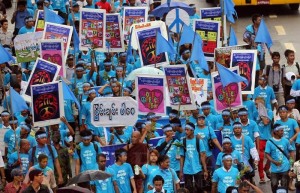Civil Society Commemorates International Peace Day in Burma
By Burma Partnership • September 24, 2013 On 21 September, civil society from Burma and the region marked the International Day of Peace with many activities to highlight the urgent need for lasting peace in Burma.
On 21 September, civil society from Burma and the region marked the International Day of Peace with many activities to highlight the urgent need for lasting peace in Burma.
Civil society in Rangoon organized a large event, including many young activists who were charged under Article 18 of the Peaceful Assembly and Peaceful Procession Law and are still facing charges for marching on International Day of Peace last year. Around 300 people from 60 different civil society organizations marched through 8 townships from City Hall to the People’s Park, shouting slogans “May the Union be peaceful,” “Build national reconciliation” and “Stop war.” Though plagued by constant heavy rain, the event, unlike previous years, was held with permission of local authorities. It was also attended by high-level government officials, including government peace negotiator, Minister Aung Min, and Minister of the President’s Office, Soe Thein.
Members of civil society, after giving the opportunity for the government officials to make speeches, publicly stated their demands for peace, right in front of the ministers. They called for the immediate cessation of the Burma Army’s offensives in Kachin State, a nationwide ceasefire, and most important of all, the realization of federalism through an all-inclusive national conference, reinforcing the statement endorsed by thousands of people on the 8888 Silver Jubilee.
Another event was also held in Tavoy, Tenasserim Region, to commemorate the International Day of Peace and show solidarity with ethnic nationality peoples who continue to suffer due to armed conflict and ongoing human rights violations.
These calls were echoed in a short documentary film produced by Burma Partnership and released on the International Day of Peace. The film, entitled “Guns, Briefcases and Inequality: The Neglected War in Kachin State,” questions whether the government’s current process will really lead to sustainable peace and national reconciliation. It also highlights how development projects and natural resource management are exacerbating armed conflict and human rights violations in ethnic areas, without adequate means to justice for the people. Burma Partnership also released a briefing paper that looks more in depth at the flaws in the peace process so far.
Peace day in Burma was also marked by the Global Partnership for Prevention of Armed Conflict (GPPAC)’s solidarity visit to Kachin State, where GPPAC members from Southeast Asia, who have been involved in successful and ongoing peace negotiations in their respective countries and in the region, met with the Technical Advisory Team of the Kachin Independence Organization and Kachin civil society organizations. They listened to the local communities and stakeholders, especially the victims of the ongoing conflict, and shared their experiences and inputs.
Also coinciding with the International Day of Peace, the border-based women’s umbrella organization, the Women’s League of Burma, and a network of local women’s organizations in Burma, Women’s Organization Network, jointly organized a women’s forum from 20-22 September in Rangoon. As many as 400 representatives from women’s organizations, political parties, women Members of Parliament, other civil society organizations and individuals of different ethnic backgrounds from inside Burma, the border areas and overseas, came together to discuss the issues of legal protection for women and gender equality, women and constitution, federalism and the peace process. This marked the first time that women activists from Burma came together to addressing these issues.
This surge of civil society voices demonstrates the desire for lasting peace throughout the country. Various ethnic communities feel that the government is rushing the peace process, something that has been reiterated by international actors involved in the process. There is increasing concern that the nationwide ceasefire accord that the government is currently striving for would not be the right step to take at the current stage of the peace process and will not address the underlying causes of armed conflict in Burma’s ethnic nationality areas: the lack of equality, self-determination and justice. The government and the Burma Army must agree to engage in meaningful political dialogue with all ethnic nationalities on equal terms, including discussions on amending the 2008 Constitution. This dialogue is essential for Burma to achieve equality, national reconciliation, and most importantly, for the country’s democratic transition, as the reform process will only be able to continue so far if there is not lasting peace and a solution to the issues of inequality, self-determination and lack of justice.
Burma’s people have suffered long enough from decades of war and inequality. The government and those international actors who are supporting or involved in the peace process must ensure that their efforts reflect the reality on the ground, match the needs of the people, especially the non-Burman ethnic nationality people from conflict-affected communities, and do not exacerbate the long time suffering of these vulnerable people.
Tags: Burma Partnership, International Day of Peace, Peace, Peace Process, ProtestThis post is in: Blog
Related PostsBurma Partnership Celebrates Continuing Regional Solidarity for Burma and Embraces the Work Ahead for Progressive Voice
Burma Army Displays Blatant Disregard for 21st Century Panglong Peace Process
Ann Din Coal Power Plant: Local Movement and Action to Preserve and Protect Natural Resources and Land: Mon IDP Report Case Study #4
Latest Human Rights Abuse Case Demonstrates Urgent Need to Reform the Myanmar National Human Rights Commission
Human Rights Far From Guaranteed as US Sanctions on Burma Are Removed









 All posts
All posts